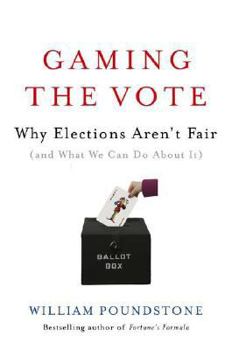Gaming the Vote: Why Elections Aren't Fair (and What We Can Do about It)
Select Format
Select Condition 
Book Overview
At least five U.S. presidential elections have been won by the second most popular candidate, but these results were not inevitable. In fact, such an unfair outcome need never happen again, and as... This description may be from another edition of this product.
Format:Hardcover
Language:English
ISBN:0809048930
ISBN13:9780809048939
Release Date:February 2008
Publisher:Hill & Wang
Length:338 Pages
Weight:1.35 lbs.
Dimensions:1.2" x 6.3" x 9.3"
Customer Reviews
4 ratings
In one word: Compelling
Published by Thriftbooks.com User , 15 years ago
Received for the holidays, and quickly devoured, William Poundstone's Gaming the Vote. I absolutely loved this book, as its layout mirrored my own exploration of the issue of fair voting, and was filled with the sorts of great examples that grab and focus attention, written in a way that brings out the very human characters that underlie what seems, on the surface, to be a dryly academic topic. Basically, it's the book I would love to write, if I had Poundstone's experience, training, and writing ability. Starting with an anectdote about Kurt Godel (one of my other favorite books is Douglas Hofstadter's Godel, Escher, Bach), it lays out all the problems with our current voting system, with examples scatterd across American history, from Lincoln (and his 39.8% popular-vote win) all the way up to 2006's midterm elections. Once the problem is laid out, Poundstone starts searching for solutions, again giving us great real-life examples full of all-too-human characters, including Kenneth Arrow (winner of the Nobel Prize in Economics), Lewis Carrol (author of Alice in Wonderland), and Lee Atwater (Nixon's expert slime-man.) Along the way, he points out all the downsides of IRV, Condorcet's method, Approval voting, and even his favorite horse, Range voting. Most compelling is his diagram of Baysian Regret of various voting methods (basically, the sum total of how upset people are about an election's result), which strongly suggest that he's right: Range voting scores best. The book ends by calling me out; asking if any municipality would be willing to step up to the plate and put Range voting into law. Well Mr. Poundstone, I accept your challenge. (crossposted from "The Least of all Evils" voting-reform blog, "leastevil" on blogspot)
Best in Class!
Published by Thriftbooks.com User , 15 years ago
Most books that attempt to propose new ways of carrying out elections are nothing more than sour grapes: "Since *my* guy didn't win the last election, the system is obviously flawed and should be overhauled." Therefore, most of these sort of books are a waste of time. This one, however, is simply brilliant. Instead of approaching the subject through party results, Poundstone instead takes a historical walk through many different voting schemes in terms of the mathematical theory behind them. Don't be scared by the word "mathematical", by the way...Poundstone not only steers clear of intense mathematics but also provides a simple glossary to help you remember something you may have forgotten from earlier pages. While I think I can determine his political leanings from a couple of different allusions, he makes such a good argument and has such an engaging style of writing that it doesn't matter. There were several times when I noticed a flaw in the argumentation and Poundstone responds to the particular question on the VERY NEXT page. Any author that can read the mind of an informed reader is doing a good job indeed. :) In conclusion, anyone who's interested in the process of voting should read this one because it's the best of its kind.
Fascinating and fun
Published by Thriftbooks.com User , 16 years ago
This is a fascinating and fun review of various voting systems and their failures. Mathematically, the core of the book can be summed up in one page (one page that happens to be in the book and says it all with a chart). But this book isn't just about math, it is about the history of voting, the various issues and debates surrounding it. It is thus a fun read on several levels. I did wish the concluding chapter went a bit further. But it certainly had me convinced that we should switch to a rating system for political voting. I know personally I'd like to give ratings to the various folks who are running... wouldn't mind leaving them a review or two either.
Fascinating take on an important topic
Published by Thriftbooks.com User , 16 years ago
Gaming the Vote starts with a horrific/hilarious tale of American politics at its worst, the election for Louisiana Governor in 1991 that put a classic corrupt politician, Edwin Edwards, running against a former Grand Wizard of the Ku Klux Klan, David Duke. The book asks how our system of elections has failed, and looks at the many possible remedies that have been proposed over the years. Along the way, you meet Kenneth Arrow and his impossibilty theorem, Lewis Carroll, Adam Clayton Powell, and Lee Atwater, the father of the attack ad. Thre's a lot of incredibly important ideas, almost of all of it fun and fast reading.




